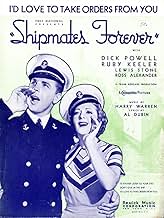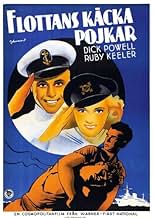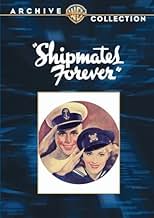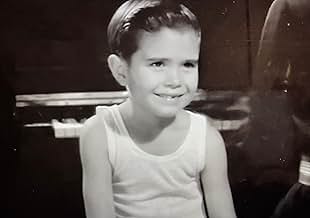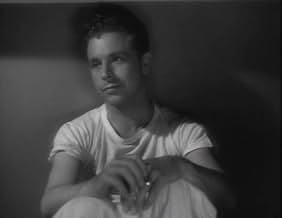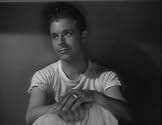Ajouter une intrigue dans votre langueA successful crooner who doesn't want to join the Navy decides to prove to his father, a Navy admiral, that he has what it takes to make it in the fleet.A successful crooner who doesn't want to join the Navy decides to prove to his father, a Navy admiral, that he has what it takes to make it in the fleet.A successful crooner who doesn't want to join the Navy decides to prove to his father, a Navy admiral, that he has what it takes to make it in the fleet.
- Prix
- 1 victoire au total
Ernie Alexander
- Radio Fan
- (uncredited)
Joan Barclay
- Song Spectator
- (uncredited)
Eleanor Bayley
- Song Spectator
- (uncredited)
Frederick Burton
- Adm. Fred Graves
- (uncredited)
Mabel Colcord
- Cowboy's Mother
- (uncredited)
Ronnie Cosby
- Boy in Dance Class
- (uncredited)
Virginia Dabney
- Song Spectator
- (uncredited)
Gloria Faythe
- Song Spectator
- (uncredited)
James Flavin
- Instructing Officer
- (uncredited)
Avis en vedette
An enjoyable if slightly sappy movie with a fairly standard plot line.
Notably, the song from this film "Shipmates Stand Together" is still performed as part of a medley by the US Naval Academy Men's Glee Club.
Speaking about the music from the film, the US Military Academy's Alma Mater (that's Navy's gridiron rival West Point!) is used as background music at least three times, including in the closing scene.
Interesting goof, possibly intentional?
The scenes dealing with the upperclassmen "rating" the Plebes are fun; they are different in detail but not in quality from what goes on at the Academy even today.
Of the movies available on VHS or DVD about the Naval Academy, I would rank this about in the middle:
1. Navy Blue and Gold (1937) 2. Midshipman Jack (1933) 3. Shipmates Forever 4. An Annapolis Story (1955) - pretty bad. 5. Annapolis (2006) - truly dreadful.
Notably, the song from this film "Shipmates Stand Together" is still performed as part of a medley by the US Naval Academy Men's Glee Club.
Speaking about the music from the film, the US Military Academy's Alma Mater (that's Navy's gridiron rival West Point!) is used as background music at least three times, including in the closing scene.
Interesting goof, possibly intentional?
The scenes dealing with the upperclassmen "rating" the Plebes are fun; they are different in detail but not in quality from what goes on at the Academy even today.
Of the movies available on VHS or DVD about the Naval Academy, I would rank this about in the middle:
1. Navy Blue and Gold (1937) 2. Midshipman Jack (1933) 3. Shipmates Forever 4. An Annapolis Story (1955) - pretty bad. 5. Annapolis (2006) - truly dreadful.
SHIPMATES FOREVER (Warner Brothers, 1935) cashes in on the recent success of FLIRTATION WALK (1934), set in West Point, reuniting Dick Powell, Ruby Keeler, Ross Alexander, John Arledge, Frederick Burton, with Frank Borzage as their director, in a Navy themed product filmed on location at Annapolis, Maryland. As with FLIRTATION WALK, SHIPMATES FOREVER centers mostly upon Powell, not so much for his crooning, but his ability as a serious actor and ladies man. Although labeled a musical, the movie emphases more on plot than tunes, and contains more tearful/ sentimental moments than comedy, thus being a true departure for both Powell or Keeler, best known for their backstage musicals with Busby Berkeley dance numbers and gold digging chorus girls.
The scenario has Powell playing Richard John "Dick" Melville III, singer at the Sky Club in New York City, who would rather be entertaining than serving in the Navy as traditionally expected of him by his admiral father (Lewis Stone). Dick meets and immediately falls in love with June Blackburn (Ruby Keeler), a dancing teacher for little children, who also comes from a long line of Navy relatives. With the intention of taking his Navy entrance exam to show his father he can pass it, and not entering the academy, Dick has a change of heart and enters the academy anyway, but with the intention of throwing away his commission in the end. Dick soon resents the friendship of his fellow roommates and rooms alone after plebe year. Basically a loner and a disappointment to his father, Dick's only companion happens to be June. After risking his life saving a fellow shipmate, Johnny "Coxwain" Lawrence (John Arledge) from an exploding boiling room, Dick becomes a hero to his fellow shipmates, but it will be at graduation to show whether or not Dick has the making being a true Navy man.
Also in the cast are Robert Light (Ted Sterling); Eddie Acuff ("Cowboy" Lincoln); Dick Foran (Gifford); and Mary Treen (Cowboy's Girlfriend); Of the supporting players, it's Ross Alexander who adds some good doses of comedy as Lafayette "Sparks" Brown from Arkansas. His one scene where he successfully sneaks in a radio into his room during plebe year under the noses of his superiors should gather up few chuckles, especially when being too close to call.
When I first watched SHIPMATES FOREVER on Memorial Day weekend on Turner Network Television (TNT) back in 1989, I actually didn't care for it mainly because I was expecting a big song and dance/ flag waving, military musical in the tradition of BORN TO DANCE or FOLLOW THE FLEET (both 1936), or possibly an overblown lavish scale production in the manner of MGM's ANCHOR'S AWEIGH (1945) with Keeler tap dancing galore and Powell leading a parade of singing sailors, but after repeated viewing whenever shown on Turner Classic Movies, I find that SHIPMATES FOREVER breaks away from the usual military musical clichés, and truly believe it holds up better than FLIRTATION WALK mainly due to its realistic way Navy life is depicted.
With tunes by Harry Warren and Al Dubin, including "Don't Give Up the Ship," "I'd Love to Take Orders From You" and the charming "I'd Rather Listen to Your Eyes," the songs grow tiresome after being re-prised two or three times. While Keeler never tap danced in FLIRTATION WALK, she doesn't sing a note in SHIPMATES FOREVER, yet shows off her dancing skill in two brief sequences, one in a dancing school to the amazement of her students (The Meglin Kiddies), and another at the Sky Club. In spite of several time outs for a song, there are no production numbers at all. Reportedly distributed in theaters at 124 minutes, it's the 109 minute print that's currently in circulation on the TV markets. While Powell recruited to military duty as THE SINGING MARINE (1937), he would make a return engagement into the Navy once again, co-starring opposite the popular comedy team of Bud Abbott and Lou Costello for IN THE NAVY (Universal, 1941).
Trivia: The theme to SHIPMATES FOREVER was reworked as a 1939 military programmer titled ON DRESS PARADE (WB, 1939) starring The Dead End Kids, with Leo Gorcey assuming the role originally enacted by Powell, but minus the singing. (** Bells)
The scenario has Powell playing Richard John "Dick" Melville III, singer at the Sky Club in New York City, who would rather be entertaining than serving in the Navy as traditionally expected of him by his admiral father (Lewis Stone). Dick meets and immediately falls in love with June Blackburn (Ruby Keeler), a dancing teacher for little children, who also comes from a long line of Navy relatives. With the intention of taking his Navy entrance exam to show his father he can pass it, and not entering the academy, Dick has a change of heart and enters the academy anyway, but with the intention of throwing away his commission in the end. Dick soon resents the friendship of his fellow roommates and rooms alone after plebe year. Basically a loner and a disappointment to his father, Dick's only companion happens to be June. After risking his life saving a fellow shipmate, Johnny "Coxwain" Lawrence (John Arledge) from an exploding boiling room, Dick becomes a hero to his fellow shipmates, but it will be at graduation to show whether or not Dick has the making being a true Navy man.
Also in the cast are Robert Light (Ted Sterling); Eddie Acuff ("Cowboy" Lincoln); Dick Foran (Gifford); and Mary Treen (Cowboy's Girlfriend); Of the supporting players, it's Ross Alexander who adds some good doses of comedy as Lafayette "Sparks" Brown from Arkansas. His one scene where he successfully sneaks in a radio into his room during plebe year under the noses of his superiors should gather up few chuckles, especially when being too close to call.
When I first watched SHIPMATES FOREVER on Memorial Day weekend on Turner Network Television (TNT) back in 1989, I actually didn't care for it mainly because I was expecting a big song and dance/ flag waving, military musical in the tradition of BORN TO DANCE or FOLLOW THE FLEET (both 1936), or possibly an overblown lavish scale production in the manner of MGM's ANCHOR'S AWEIGH (1945) with Keeler tap dancing galore and Powell leading a parade of singing sailors, but after repeated viewing whenever shown on Turner Classic Movies, I find that SHIPMATES FOREVER breaks away from the usual military musical clichés, and truly believe it holds up better than FLIRTATION WALK mainly due to its realistic way Navy life is depicted.
With tunes by Harry Warren and Al Dubin, including "Don't Give Up the Ship," "I'd Love to Take Orders From You" and the charming "I'd Rather Listen to Your Eyes," the songs grow tiresome after being re-prised two or three times. While Keeler never tap danced in FLIRTATION WALK, she doesn't sing a note in SHIPMATES FOREVER, yet shows off her dancing skill in two brief sequences, one in a dancing school to the amazement of her students (The Meglin Kiddies), and another at the Sky Club. In spite of several time outs for a song, there are no production numbers at all. Reportedly distributed in theaters at 124 minutes, it's the 109 minute print that's currently in circulation on the TV markets. While Powell recruited to military duty as THE SINGING MARINE (1937), he would make a return engagement into the Navy once again, co-starring opposite the popular comedy team of Bud Abbott and Lou Costello for IN THE NAVY (Universal, 1941).
Trivia: The theme to SHIPMATES FOREVER was reworked as a 1939 military programmer titled ON DRESS PARADE (WB, 1939) starring The Dead End Kids, with Leo Gorcey assuming the role originally enacted by Powell, but minus the singing. (** Bells)
I first saw this film over 40 years ago and viewing it again it was as good as I remember it. The team that brought you Flirtation Walk, director Frank Borzage and stars Dick Powell and Ruby Keeler did even better in my opinion with their film about a Naval Midshipman at Annapolis and his lady love.
Like Flirtation Walk, both Powell and Keeler come from service families. But Powell's a disappointment to his father, Admiral Lewis Stone. He's a crooner on the radio and from what we see is making a pretty good living at it. Still a combination of persuasive techniques by Stone and Keeler get him to follow in the Naval tradition of his family.
For reasons I don't understand Ruby did not dance a step in Flirtation Walk, but she makes up for it here. It was a weakness in the other film that is now remedied.
Dick Powell got two lovely ballads to sing, I'd Rather Listen To Your Eyes and I'd Love to Take Orders from You. Possibly because he was changing record companies from Brunswick to Decca in 1935 he didn't record either of those songs commercially. That's a pity because he does them so well.
What he did record was the song Don't Give Up the Ship with an orchestra and choral background. That song had a lot of popularity, so much so that the Naval Academy at Annapolis adopted it as their official song, something I'm sure Dick Powell and songwriters Harry Warren and Al Dubin must have been proud of.
Like he did with Flirtation Walk, Frank Borzage got to do some location shooting for Shipmates Forever at Annapolis and on the battleship, USS Pennsylvania. It certainly made for a far more realistic setting than in most Thirties films.
Unlike Flirtation Walk which was more upbeat, Shipmates Forever has the death of one of Powell's classmates which certainly lent a somber, but more realistic note to the proceedings.
Ross Alexander, Eddie Acuff, and John Arledge play Powell's roommates and all do good jobs in roles they are usually typecast in. Shipmates Forever is one of Dick Powell's best Warner Brothers musicals from the Thirties and its charm is eternal.
Like Flirtation Walk, both Powell and Keeler come from service families. But Powell's a disappointment to his father, Admiral Lewis Stone. He's a crooner on the radio and from what we see is making a pretty good living at it. Still a combination of persuasive techniques by Stone and Keeler get him to follow in the Naval tradition of his family.
For reasons I don't understand Ruby did not dance a step in Flirtation Walk, but she makes up for it here. It was a weakness in the other film that is now remedied.
Dick Powell got two lovely ballads to sing, I'd Rather Listen To Your Eyes and I'd Love to Take Orders from You. Possibly because he was changing record companies from Brunswick to Decca in 1935 he didn't record either of those songs commercially. That's a pity because he does them so well.
What he did record was the song Don't Give Up the Ship with an orchestra and choral background. That song had a lot of popularity, so much so that the Naval Academy at Annapolis adopted it as their official song, something I'm sure Dick Powell and songwriters Harry Warren and Al Dubin must have been proud of.
Like he did with Flirtation Walk, Frank Borzage got to do some location shooting for Shipmates Forever at Annapolis and on the battleship, USS Pennsylvania. It certainly made for a far more realistic setting than in most Thirties films.
Unlike Flirtation Walk which was more upbeat, Shipmates Forever has the death of one of Powell's classmates which certainly lent a somber, but more realistic note to the proceedings.
Ross Alexander, Eddie Acuff, and John Arledge play Powell's roommates and all do good jobs in roles they are usually typecast in. Shipmates Forever is one of Dick Powell's best Warner Brothers musicals from the Thirties and its charm is eternal.
There's a lot to like in SHIPMATES FOREVER, but it's really a treat for DICK POWELL's fans with him singing a batch of songs (only a couple are really catchy), with generous close-ups of pert and pretty RUBY KEELER as the gal who can't make up her mind about the sailor she loves.
Keeler is only given a couple of tapping moments, which is fine with me. I have to agree with the book "Warner Bros. Presents" which describes her as "conspicuously untalented" but managing to be "endearing" nevertheless.
It's the formula story about a young man whose father is a Navy veteran (LEWIS STONE) and thinks his son should follow in his footsteps. The son happens to be a popular radio crooner who only half-heartedly joins the service just to prove that he can pass the officer's exam. The predictable plot follows a standard course with the boy winning the love of the girl by the time we reach the final reel.
Powell gets to demonstrate that he had a flair for carrying a tune although his voice is nothing remarkable. He's pleasant to watch and handles the acting chores with professional ease.
I can't say the same for ROSS Alexander who mugs through his role as comedy relief, but JOHN ARLEDGE does a fine job as an ill-fated sailor friend who attempts to put out a boiler room fire.
Touches of drama are better than the humorous interludes, so it's an uneven film, to say the least, directed by Frank Borzage who usually does much more sentimental romances than patriotic musicals like this one.
Keeler is only given a couple of tapping moments, which is fine with me. I have to agree with the book "Warner Bros. Presents" which describes her as "conspicuously untalented" but managing to be "endearing" nevertheless.
It's the formula story about a young man whose father is a Navy veteran (LEWIS STONE) and thinks his son should follow in his footsteps. The son happens to be a popular radio crooner who only half-heartedly joins the service just to prove that he can pass the officer's exam. The predictable plot follows a standard course with the boy winning the love of the girl by the time we reach the final reel.
Powell gets to demonstrate that he had a flair for carrying a tune although his voice is nothing remarkable. He's pleasant to watch and handles the acting chores with professional ease.
I can't say the same for ROSS Alexander who mugs through his role as comedy relief, but JOHN ARLEDGE does a fine job as an ill-fated sailor friend who attempts to put out a boiler room fire.
Touches of drama are better than the humorous interludes, so it's an uneven film, to say the least, directed by Frank Borzage who usually does much more sentimental romances than patriotic musicals like this one.
While this film has a few very familiar clichés and Dick Powell is way too old to play a college freshman, it is an enjoyable film....and one I recommend.
When the film begins, Dick (Dick Powell) is visiting his father, the Admiral (Lewis Stone). Their meeting is a bit tense, as the Admiral longs for his son to join the Navy and make a man of himself. Dick is more content to be a successful singer. Additionally, Dick's lady (Ruby Keeler) likes that Dick isn't in the Navy, as her family has a long naval history...and she's lost a couple close loved ones during the war. Inexplicably, Dick suddenly reverses himself and joins the Naval Academy!! This DEFINITELY came from out of no where and soon he's in Annapolis doing everything but going to classes. Like most college films of the era, they never show any of the men going to classes! Instead, Dick is hazed and he remains aloof from the other cadets. After all, he has no intention of staying in the Navy for long. And, not surprisingly, the Admiral is ashamed to call him his son. Can Dick redeem himself and gain a sense of camaraderie? Or will he remain a bit of a butt-head? What do you think?
This film follows a very familiar pattern seen in many film (such as "A Yank at Eton" and even "A Chump at Oxford" to an extent). But it manages to do it very well...better than I'd expected. Much of this is due to Powell's nice performance and much of it is the nice location shooting...aboard ships and at the Academy. Worth seeing even if the picture is a bit dated and predictable.
When the film begins, Dick (Dick Powell) is visiting his father, the Admiral (Lewis Stone). Their meeting is a bit tense, as the Admiral longs for his son to join the Navy and make a man of himself. Dick is more content to be a successful singer. Additionally, Dick's lady (Ruby Keeler) likes that Dick isn't in the Navy, as her family has a long naval history...and she's lost a couple close loved ones during the war. Inexplicably, Dick suddenly reverses himself and joins the Naval Academy!! This DEFINITELY came from out of no where and soon he's in Annapolis doing everything but going to classes. Like most college films of the era, they never show any of the men going to classes! Instead, Dick is hazed and he remains aloof from the other cadets. After all, he has no intention of staying in the Navy for long. And, not surprisingly, the Admiral is ashamed to call him his son. Can Dick redeem himself and gain a sense of camaraderie? Or will he remain a bit of a butt-head? What do you think?
This film follows a very familiar pattern seen in many film (such as "A Yank at Eton" and even "A Chump at Oxford" to an extent). But it manages to do it very well...better than I'd expected. Much of this is due to Powell's nice performance and much of it is the nice location shooting...aboard ships and at the Academy. Worth seeing even if the picture is a bit dated and predictable.
Le saviez-vous
- AnecdotesNear the end of the movie is a great shot of a Martin P3M-2 seaplane landing in the ocean. Markings on the side of the plane show a "6". Only 6 P3M-2s were ever built.
- GaffesThe West Point Alma Mater is played several times throughout the movie. This must drive Annapolis graduates nuts.
- Citations
Lafayette 'Sparks' Brown: I was raised on radio. Weaned on radio. Gotta have a radio.
- ConnexionsReferenced in I'd Love to Take Orders from You (1936)
- Bandes originalesDon't Give Up the Ship
(uncredited)
Music by Harry Warren
Lyrics by Al Dubin
Played during the opening credits
Played occasionally throughout the picture
Sung by Dick Powell
Later danced to by Ruby Keeler
Frequently played in the background
Meilleurs choix
Connectez-vous pour évaluer et surveiller les recommandations personnalisées
Détails
- Durée1 heure 49 minutes
- Couleur
- Mixage
- Rapport de forme
- 1.37 : 1
Contribuer à cette page
Suggérer une modification ou ajouter du contenu manquant

Lacune principale
By what name was Shipmates Forever (1935) officially released in India in English?
Répondre
